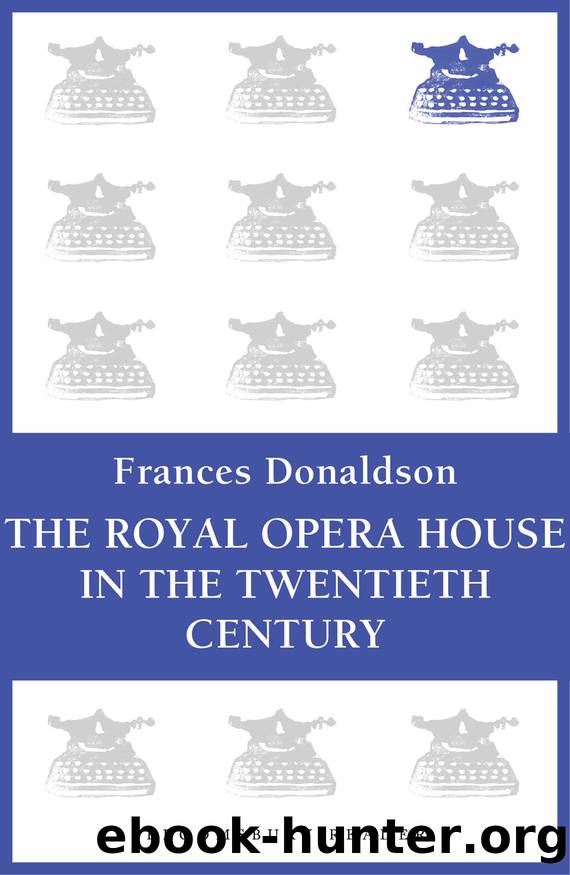The Royal Opera House in the Twentieth Century by Frances Donaldson

Author:Frances Donaldson
Language: eng
Format: epub
Publisher: Bloomsbury Publishing
Published: 1988-08-14T16:00:00+00:00
10
ADMINISTRATION 1958-1962
Lord Drogheda
On 5 January 1958 Lord Waverley died. He had lived to see the production of The Trojans but not that of Don Carlos. Lord Drogheda has remarked that the informal method of David Webster’s selection in 1946 would later have been unacceptable. ‘His lack of previous experience would have ruled against him, and I think it unlikely that he would have been chosen.’1 Even more improbable was the choice of Lord Waverley to follow Keynes, since, having appointed as General Administrator a man who had never run an opera house, the Covent Garden Trust, backed by the Arts Council, proceeded to elect a Chairman who had never seen an opera.
Many tales are told of Lord Waverley in office, among the best of which was his rebuke to his wife when she made some criticism of a performance. ‘Don’t crab them Ava, you must remember that they are doing their best.’2 More important perhaps are the words with which it is said he would bring to an end any attempt by members of the Board to pursue a discussion or criticism of administrative policy. ‘I think’, he would say on those occasions, ‘this is a matter we can safely leave to Mr Webster.’3
Lord Drogheda went to Covent Garden originally as secretary to the Board, a post he took over when his predecessor, Denis Rickett, left to become Treasury Representative and Minister Economic at the British Embassy in Washington, and held until he was elected to the Board in 1954. The obvious successor to Waverley in 1958, he had deputized for him during his final illness. As Chairman he had no difficulty in conforming to the stipulation, subsequently laid down by one of his Board, that the first requirement in anyone elected to it should be that music was a central passion in his life. Drogheda was immensely musical and his wife a fine pianist. He was forty-eight when he succeeded Waverley and he already had considerable administrative experience. In the war, after a short period of military service in France, he had been attached to the War Secretariat, and he later served as one of two private secretaries to Oliver Lyttelton at the new Ministry of Production. He had been one of the principals concerned in the negotiations which preceded the merger of the Financial News and the Financial Times, and, when he became Chairman at Covent Garden, he was Managing Director of the combined newspapers now called the Financial Times. Yet, if a good administrator, he succeeded by methods peculiar to himself, which, he himself has best described when speaking of his relationship with Gordon Newton, editor of the Financial Times.
As to Gordon and myself, there is no doubt that at first we were quite good at getting on one another’s nerves. In this respect I was the active and Gordon the passive agent. I made myself a great nuisance because if I felt a certain line of development was desirable I kept on pressing for action.... Gordon once referred to me as his goad, a charge to which I admit.
Download
This site does not store any files on its server. We only index and link to content provided by other sites. Please contact the content providers to delete copyright contents if any and email us, we'll remove relevant links or contents immediately.
The Goal (Off-Campus #4) by Elle Kennedy(13627)
Kathy Andrews Collection by Kathy Andrews(11777)
Diary of a Player by Brad Paisley(7531)
What Does This Button Do? by Bruce Dickinson(6176)
Assassin’s Fate by Robin Hobb(6173)
Big Little Lies by Liane Moriarty(5761)
Altered Sensations by David Pantalony(5080)
Pale Blue Dot by Carl Sagan(4969)
Sticky Fingers by Joe Hagan(4156)
The Death of the Heart by Elizabeth Bowen(3589)
The Heroin Diaries by Nikki Sixx(3525)
Beneath These Shadows by Meghan March(3285)
Confessions of a Video Vixen by Karrine Steffans(3283)
How Music Works by David Byrne(3239)
The Help by Kathryn Stockett(3127)
Jam by Jam (epub)(3060)
Harry Potter 4 - Harry Potter and The Goblet of Fire by J.K.Rowling(3038)
Computational Linguistics and Intelligent Text Processing: 20th International Conference, CICLing 2019 La Rochelle, France, April 7â13, 2019 Revised Selected Papers, Part I by Alexander Gelbukh(2968)
Strange Fascination: David Bowie: The Definitive Story by David Buckley(2844)
